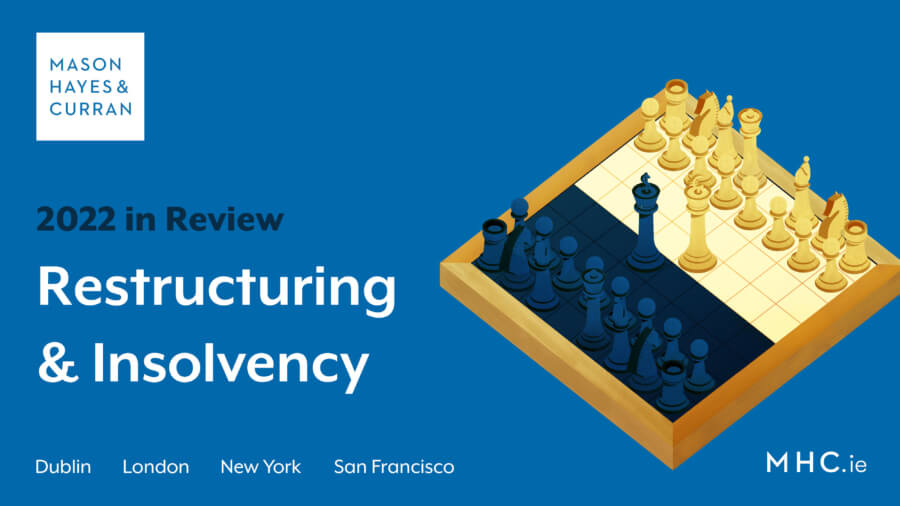
Corporate insolvency numbers continued to appear artificially low in 2022. The expectation is that they will rise once businesses need to deal with the aftermath of Government pandemic supports and, in particular, start to pay warehoused taxes.
During the year, there has been a small but increasing number of restructurings using SCARP, which will hopefully act as pathfinders when volumes rise. At the time of writing, there is one case in which a dispute is pending before the court and, although it is intended as an out of court process, it is inevitable that certain aspects will ultimately be determined by the courts.
There has also been a significant amendment of examinership to fully align it with the EU Preventative Restructuring Directive. We anticipate that these changes may make examinership more expensive and difficult. However, there are no published judgments under the amended regime as yet.
First Small Company Administrative Rescue Processes
The Companies (Rescue Process for Small and Micro Companies) Act 2021, introduced in December 2021, provides an alternative rescue process to examinership for small and micro companies. It is intended to be cheaper and quicker than examinership. The process is generally referred to as “SCARP”.
To achieve the intended efficiencies, the insolvency practitioner running the process, called the processor advisor, has a significantly expanded role from that of an examiner. In particular, in SCARP, the process advisor also has the role of the independent expert and part of the role of the court in examinership.
We have advised on a number of SCARPs, both on the process adviser side and for secured creditors, but the overall volume has been quite low, as yet. We attribute this, in part, to the possibility of SCARP being used as a negotiation tool resulting in voluntary restructuring and, in part, to the continued effects of Government pandemic supports.
Related insights:
Facing Financial Difficulties? New Rescue Process for Small Companies
Creditors Holding Guarantees Need to Plan to Respond Promptly to SCARP
Amendments to the Examinership Regime
Examinership in Ireland is a well-developed restructuring process, derived from Chapter 11 in the US, which has been used successfully to restructure a significant number of companies.
The Irish Government was obliged to implement the EU Preventive Restructuring Directive and it could have done so by introducing a new process. However, instead it decided to amend the examinership legislation.
Perhaps of most significance, the amendments to the process make voting required to approve a scheme significantly more complex. However, the amendments also provide that:
- employees may sue the company in examinership;
- the freedom of action of contractual counterparties in examinership is constrained; and
- the maximum period of examinership is now one year.
The amendments also place a statutory duty on directors to have regard to the best interests of creditors when a company is likely to be unable to pay its debts. This is largely a statutory restatement of a duty long recognised by the courts.
Piercing the Corporate Veil – Personal Liability of Directors
David and Jonathan Cartu used Greymountain Management Limited, an Irish limited company, to process payments in perhaps the largest fraud ever before the Irish courts. Almost all of the victims of this fraud were outside Ireland.
The Cartu brothers were shadow directors of Greymountain and installed two Irish directors, one a professional director and the other a business student. The directors signed a power of attorney on behalf of the company in favour of David Cartu. The directors had little idea what the company was doing.
The court had no hesitation in imposing personal liability on the Cartu brothers, as shadow directors for the debts of the company.
As regards the directors, the court held that:
“…the fact that a director is legally empowered to grant a power of attorney to a third party does not mean that it is appropriate for that to be done in a particular case. Furthermore, it is not a defence, where in addition to granting the power of attorney, both directors do not oversee, to any degree, the purpose for which the power of attorney was used. “
and imposed personal liability on the directors.
This is the first reported Irish case in which personal liability has been imposed on directors, or shadow directors, of an insolvent company.
The directors in this case do not appear to have been aware of the fraud but the judgment makes it clear that personal liability can be imposed for failure to investigate and supervise how the business of a company is being conducted.
Comment
The first few successful SCARPs combined with the changes to the examinership regime appear likely to tilt the balance towards SCARP and away from examinership where that is possible, at least until a few examinerships have been completed under the amended regime.
The Greymountain judgment makes it very clear that directorship is not a risk-free sinecure and that directors are required to understand what the business is doing, and to supervise those to who they delegate authority, or potentially face personal liability.
For more information, contact a member of our Restructuring & Insolvency team.
The content of this article is provided for information purposes only and does not constitute legal or other advice.








